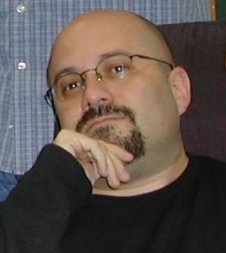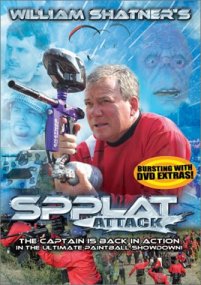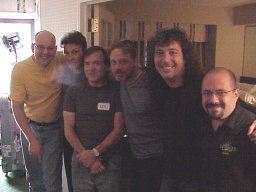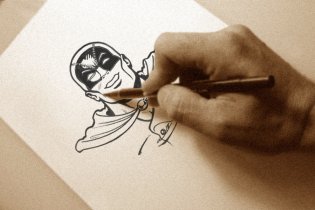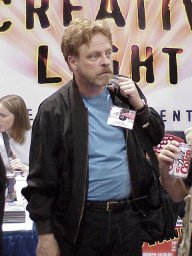|
And
Lo, There Shall Come Mittleman...
An Interview With Producer Eric Mittleman
|
|
|
Pondering
another hyphen...
|
Many of you will think I've failed you. Only after
interviewing Eric Mittleman, producer of Comic
Book: The Movie (out January 27th), the upcoming Jekyll
and many other films did I look up what those many other films
actually were. And guess what? There's a lot of stuff for
Playboy. Yes, I freely bear your scorn now, because I didn't
ask him about it.
Instead,
I took on this multi-talented man about the two projects he's
got on his plate right now for Creative
Light Entertainment. While the company awaits the Miramax
release of CB:TM at the end of the month, they're gearing
up for their Scott Zakarin-directed
update on a horror legend. (Casting news should be coming
shortly.)
It's
rare to catch Eric sitting still. When we first met him, he
was overseeing the four day whirlwind filming of CB:TM.
With a couple of different film crews and bunches of comic
actors running around the vast carnival of ComicCon, it could
only have been an experience not unlike herding cats.
Still,
Eric was always polite, if not always calm. Even when he invited
some press over for a breakfast meet and greet with Mark Hamill,
it seemed like Eric himself didn't have time to relax. So
last month at the Creative Light offices, it pretty much had
to be corner Eric and use Mark
Teague to block the door. Even then, he still took at
least one meeting during our interview.
Derek
McCaw: You're serving as line producer for Jekyll?
Eric
Mittleman: My background is that I'm more of a creative
producer, more of a writer-producer. Until January 5th, when
my line producer starts, I'll be covering the line producer
job. Then I'm the producer.
DM:
What excites you most about working on this project?
EM:
It's the first thing I'm producing that I haven't written,
or had a part in writing. I'm at a stage in my career now
where I've produced a lot of stuff that I've written, so there's
a certain freshness to it.
|
|
|
Try controlling
THIS crowd...
|
Instead of being the one who's solving a lot of the problems
simultaneously with causing the problems, I get to work more
collaboratively with a team that I've known for literally decades.
It's just a very new and very fresh thing. After doing Forbidden,
Voyeur Beach, Creature Unknown, Stan Lee's
Mutants Monsters and Marvels, Splatt
Attack and Comic Book: The Movie -- that's seven
features for this company. Prior to this I've done over a thousand
hours of straight to pay cable, DVD, and VHS programming. It's
fresh again, because there's a new twist on it.
It's
great. Everyone always asks what a producer does, so it really
helps me to define that, because I've done so many other shows
where I had some kind of hyphenate, whether it be writer-director,
writer-producer, let's see (smiles), director-executive
producer was a big one, writer-director-producer. All kinds
of stuff all over the map.
To just
focus on the producing and really, the art of producing, is
really fun and cool for me. I have the knowledge base and
experience to really know what happens in the trenches. Behind
the scenes, and post-production and all of that.
Something
I'm really big on is that you should be able to walk onto
a set, or walk into an office, and know what everyone's
job is, just by the nature of what they're doing. You have
a lot of producers that basically don't do anything. Or their
job is to make sure the star shows up, or their job is to
get the money.
But that's
not what you'd really call film producing. They're all important
and integral to the process, but they're not what you'd call
producers. I mean, Joel Silver does more than just
make sure that Warner Brothers writes a check.
You can
see as people go from producer to executive producer credits.
They get a different change in their responsibilities and
their authority.
That
said, I'd love to be able to answer the question, "what a
producer does?" but I'm not going to know until the end of
the movie. (laughs) Then I can look back and say "I
did this this and this, that that and that…"
DM:
What was it like producing a mockumentary like Comic Book:
The Movie?
|
|
|
That fabled
hotel room...
l. to r.: Scott Zakarin, Roger Rose, Billy West,
Mark Hamill,
Jess Harnell, and Eric Mittleman
|
EM:
Comic Book: The Movie was a really interesting experience.
In fact, if the movie is successful, I really want to pursue
doing a book deal, about what it was like trying to make a
movie with at least two or three divergent camps. Each wanting
to make different movies, but somehow in the end, all managing
to play well together and blend together to come up with a
really good movie. It's one of the things I'm most proud of
over the course of my career.
My job
was to wrangle the gang financially, logistically, and creatively.
Mark Hamill was doing a movie called Reeseville, shot
in Reeseville, Wisconsin. Also, Reeseville became the home
of his character in the movie, Donald Swan.
While
Mark was off in Reeseville creating Donald Swan, Commander
Courage, Codename: Courage and the whole mythology of the
characters, myself, Roger Rose, Jess Harnell, and Billy West
were here in California, creating the basic framework of the
studio half of the movie. Why the studio was hiring Donald,
what the studio's demand of Donald would be, and what the
character arcs of Roger, Jess and Billy would be.
We had
a series of meetings here right before Mark got back. I had
prepared a first draft of the outline. I met with Mark pretty
extensively before he left to do Reeseville, and revised
the outline. Then there was like a month-long period while
Mark was shooting that I did a few other revisions, then brought
it in to Roger, Jess and Billy.
One of
the great things about this movie is that we all contributed
to the framework of the movie. But each of the guys really
filled out their characters.
For example,
with Billy, I asked "what was the s****iest job you ever did?"
And he
said, "I manufactured sawhorses on the pier in Boston."
I go,
"great, that's your job for this movie."
And he
thought about it and said, "actually, I think Leo should be
a sheet metal worker."
That
was kind of the creative process about the whole thing. If
I gave these guys a bullet point about their character, they
took it and knocked it up at least four levels.
|
|
|
A moment
in the creative process...
(not Eric's hand...)
|
It's
kind of cool for me also as a writer to watch Comic Book:
The Movie and there is literally one line in the entire
movie that I wrote that made it into the final cut. There's
a lot of stuff that were germs of an idea, that I would give
somebody a line or some dialogue or some subtext, and it would
show up as something totally different. But it still kind
of traced back in part to my contribution as well as other
contributions.
To me
as a writer, that's really cool. If I had sat down and written
Comic Book: The Movie as a screenplay it would only
be a fraction as good as it ultimately turned out. Although
I don't think I'm fully equipped to write it as a screenplay,
especially because of Mark's contributions with the whole
mythology and everything that's loyal to fandom. I attended
conventions when I was younger, but I pale in comparison to
Mark as a fan.
Anyway,
having said that, you basically had as many writers as you
did cast people, with people writing their lines, creating
their lines on the spot. Debi Derryberry came down to San
Diego to play the part of the Chamber of Commerce woman. We
literally dropped off a whole bunch of brochures from San
Diego in her room and said, "…memorize a bunch of facts about
this. It's going to become useful tomorrow."
That's
all the direction she had. Then she got to the set, got a
little more direction from Mark about the beginning and the
end of the scene. Then we just threw her in there, and the
scene is just hysterical.
Maybe
it's hysterical to me because I was there, and I knew what
we feared wouldn't be there.
We've
got about a month before the film is released, and ultimately
I believe that it's the fans who really make the movie. I
always hate when filmmakers kind of go off and say, "oh, it's
the most brilliant thing you'll ever see."
I really
enjoyed this movie. I don't know if it's because I made it,
and I'm one of the many parents of this entity. Or it's something
that fans are genuinely going to gravitate to and love. And
I hope they do.
|
|
|
Mark Hamill,
either as Donald Swan
or about to direct himself as Donald Swan...
|
That's
part of the cool thing about working with these guys, Mark
in particular. I was a huge Star Wars fan growing up.
I don't have them here anymore, but during the course of the
movie, I had shipped boxes out from the East Coast, where
I grew up. And they were here in the production office while
we were doing post on the movie. Literally at the top of the
box was a 35 millimeter contact sheet from when a friend and
I snuck into the movie theater and took 35 millimeter stills
off the movie screen from Star Wars.
Mark
took one look at it and said, "oh, you owe me money."
Being
a huge Star Wars fan growing up, being a huge comic
book fan growing up, having guys like Stan Lee in this film
and having the film be something that speaks coherently to
the state of fandom was fun for us. Speaking to the state
of fandom in multimedia where usually the weakest link in
the evolution of a character is the movie version. As filmmakers,
it was saying be careful what path you go down to create a
movie; you might not get what you planned on.
It could
not be more topical than right now.
And
with that, we had to stop the tape, because Eric couldn't
sit still any longer. With a nod and a rush of wind, he was
gone.
|
